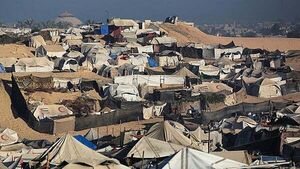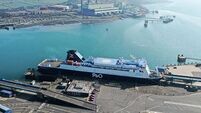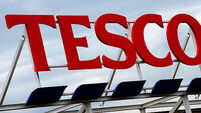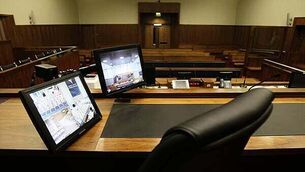MEP says Irish peacekeepers would be well suited for Gaza stabilisation force

James Cox
Irish peacekeepers would be "ideally suited" to take part in a Gaza stabilisation force due to their "credibility and reputation in the Middle East", according to a Fianna Fáil MEP.
There are currently around 300 Defence Forces members serving in a peacekeeping mission in south Lebanon, but the Unifil UN mission is due to end at the end of 2027.
In an interview with BreakingNews.ie, MEP Barry Andrews said Irish peacekeepers would be well-positioned to take part in any Gaza mission, subject to the peace deal holding.
"Where there is so much memory and knowledge about deployment in the Middle East, so many soldiers at different levels throughout the Defence Forces have worked in south Lebanon, and they could do a similar job in Gaza.
"Secondly, our credibility in the region because we were one of the first to recognise the state of Palestine, to support UNRWA, to put pressure on the Israel Trade Association Agreement, been outspoken all along, that gives us a lot of credibility with the population in Gaza.
"It's important that peacekeeping forces have local acceptance."
Given Ireland's solidarity with Gaza, and pledge to invest more funds in its rebuilding after peace, Mr Andrews said Irish peacekeepers would be a "logical next step".
"The Arab countries will have a crucial role to play with any stabilisation force, and we recognise that's where the primary source of the forces will come from. But I think the international presence besides the Arab countries, I think we are best suited to do that.
"Overall the spirit of the ceasefire is holding. There have been very serious breaches, impossible to justify, but I think there is an overall stability to this ceasefire for the moment.
"There is broad recognition that there is no alternative.
"We in Ireland must start thinking about what comes next and what we will do next, even if it's a little bit optimistic to imagine that we will get to the stage of the deployment of an international stabilisation force."
He pointed out that it would not have to come after the end of the Unifil mission in Lebanon, citing a deployment that took plac at the same time at the Golan Heights in Syria.
We have credibility internationally as peacekeepers for almost 60 years now.
"There's plenty of capacity in the Defence Forces and there has been an increase following the Commission on the Defence Forces review. I think this is really important.
"It's also motivational for members of the Defence Forces to have the opportunity to be deployed into places in the Middle East. When you are deployed there for six months it is a massive commitment but it is a good thing for our Defence Forces.
"We have credibility internationally as peacekeepers for almost 60 years now, it's part of our non-colonial history. There are a lot of reasons Irish peacekeepers are welcome almost anywhere in the world and I think the fact we've taken a very progressive position on Gaza, not just since Israel's assault but before that, I think that Ireland would be welcomed with open arms."
Triple lock
He said the triple lock would be an obstacle to this, as Irish peacekeeping missions are currently subject to veto from any of the five permanent members of the UN Security Council: China, France, Russia, the UK and the US.
The Government has proposed legislation to remove the triple lock, but it has been fiercely opposed by opposition TDs, including president-elect Catherine Connolly.
Mr Andrews said: "One of the obstacles we can't forget is if there is no UN mandate to set up a peacekeeping force, if it is something driven by the US, UK and Arab states, we would not be able to deploy unless there is a reform of the triple lock.
"I think it's important to note we haven't had a deployment of peacekeeping forces through a UN mandate since 2013, and if for some reasons one of the permanent five decide to veto it, maybe because it's an American initiative, Ireland would not be able to participate or send more than 12 soldiers.
"It does underline how important it is for us to reform the triple lock in order to avoid being caught by the absolute interia of the UN Security Council at the moment.
"The triple lock was a device that was suitable for a UN Security Council that was operational, whose values were somewhat aligned with Irish values in our Constitution, but now the council has become completely ineffective because of the widespread use of veto not just by Russia and China but also by the United States.
"I think we need to return sovereign decision making on the deployment of troops overseas to our national parliament, I don't think that in any way underlines our policy of military non-alignment."

He said there would be security considerations to any Gaza deployment, adding that he feels "we should be giving really serious consideration to it".
Mr Andrews also said Irish people, even those with no Defence Forces affiliation, should be proud of our peacekeepers.
"I was in the barracks in Rathmines when the 124th battalion were deployed to Lebanon on a bright spring afternoon and the families of those young men and women were present in huge numbers and the sense of pride that it generates in them, to see somebody representing their country and wearing the tricolour on their uniform, is really palpable, it's an extraordinary thing.
"They're doing it for peace and it also enhances Ireland's reputation internationally, it's something we should cherish and find ways to maintain that.
"It's important for the morale within the Defence Forces, public perception, and acceptance of investment in the Defence Forces.
"If they are doing things as important as stabilisation in Gaza, I think there would be greater support for additional investment in the Defence Forces."





